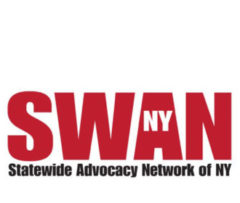Meeting held on Feb 28, 2018
Attendees
SWAN swannys.org: Brad Pivar and Pat Curran of ENYDDA , Kathy Bunce and Barb Delong DDAWNY Family Committee, Dan Maillet of GROW, Margaret Raustiala of LIANDD, Elly Rufer & Jim Karpe & Meri Krassner of NYC FAIR
New York State: Kerry Delaney, Acting Commissioner OPWDD; Shelly Weizman, Asst. Secretary for Mental Hygiene; JoAnn Lamphere, Executive Deputy Commissioner of Person-Centered Supports OPWDD; Meagan O’Conner, Deputy Commissioner of Service Delivery OPWDD; Greg Roberts, Director of Legislative Affairs OPWDD; Kevin Valenchis, Deputy Commissioner OPWDD.
February 2018 Follow-up action items
There has been progress on four of the five August 2017 follow-up areas, and many signs of hope. And, those five items from last August remain a concern for SWAN (see next page). New items, numbered starting from :
6. Barb Delong- Schedule follow-up conferences with OPWDD and with HHS office. Meeting with OPW will need to deal with vacancies in MSCs and at DDROs.
7. Shelly Weizman- Arrange for early meeting with next State Medicaid Director, to assure that Jason Helgerson’s successor understands this unique population.
8. Jim Karpe- By March 9th send Shelly Weizman & Kerry Delaney the “SWAN requests for MAPP”.
Meeting Summary
SWAN requested this meeting to continue the process of involving families in making improvements to the services provided to individuals with Intellectual and Developmental Disabilities (I/DD) in New York State. SWAN announced that LIANND, a family advocacy group from both Nassau and Suffolk counties, has now joined SWAN. Discussion focused on six topics.
Follow-up on August 2017 Action items. See numbered list below.
- Justice Center. Established with good intentions the Justice Center has created additional barriers to attracting and retaining direct service staff. SWAN is encouraged by the changes to date under the leadership of Denise Miranda. We are hopeful that the early promises of reform and transparency will result in a more effective and efficient process. We will continue to follow up.
- bFair2DirectCare. SWAN had advocated, two years ago, to pay the DSPs a salary that better matches the demands made upon them. We are grateful for the approval of the salary increases that bFair requested. However, across the state, the problem of recruiting and retention is getting worse. In 2005, average DSP salary was 30% higher than minimum wage. In 2018, even with the raises, it is only 2% higher. In addition the money promised for the salary increases has not yet reached the agencies. SWAN members stated that they are now a part of the bFair coalition and support the
coalitions request for a spin up of the funding request so that the targeted living wage would be reached by 1/1/20.
- Managed Care timeline rollout. Shelly Weizman assured us that the timeline for transition will not be impacted by Jason Helgerson’s departure.
- High needs funding. SWAN brought up again that there is not yet any funding in place for those who are medically fragile, or who have difficult behaviors. We suggested that this problem needs a new type of service, to allow their needs to be met in a least restrictive setting, without endangering others.
- MAPP. SWAN got an early demo of the Medicaid Analytics Perform Platform. We have a first set of requests to be put on the road map. These MAPP changes can be the beginning of the desired need for transparency. We believe that these requests are easy to implement, inexpensive, and absolutely essential to the transformation of the system. MAPP with these updates will be a “fast feedback loop” which will allow the monitoring the service delivery system, spot potential problems and take corrective action. SWAN will need assistance from HHS and OPWDD to ensure that these changes are given high priority in the MAPP road map.
February 2018 updates on August 2017 Follow-up action items
1. Kerry Delaney- Work to continue involving families in policy, messaging and governance. As of Feb 2018 SWAN has been invited to participate in workgroups on a number of topics, and we look forward to these starting.
2. Paul Francis and Kerry Delaney- The road-map for Managed Care roll-out to I/DD population. As of Feb 2018, not yet clear, aside from the July 1st CCO rollout.
3. Shelly Weizman- Justice Center feedback. As of Feb 2018, coordination between SWAN and the new leadership has been going well, and we hope this will continue.
4. Meagan O’Conner- Funding for high acuity individuals is still not available for individuals who are already part of the system. As of Feb 2018, there is now a workgroup on high acuity, but no meeting yet.
5. Paul Francis and SWAN- Paul Francis’s staff to provide information about possible ABLE tax credit policies. Then SWAN will come back with a response and recommendation. As of February 2018, we have not seen that information from Paul’s staff.
